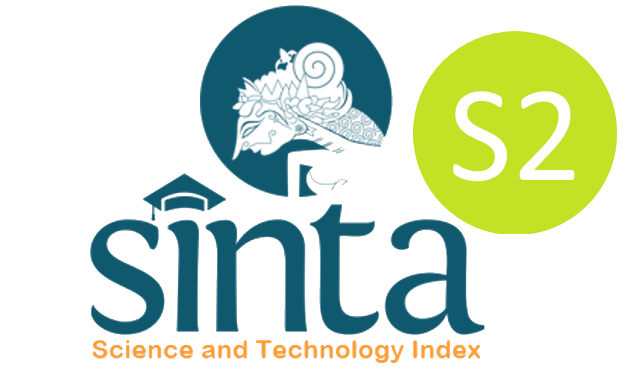Abstract
The study aimed to adapt the Fear of Missing Out (FoMO) Scale developed by Alt (2015). Instead of measuring FoMO only in a social context such as in previous studies, the development of this FoMO Scale was to also identify the levels of FoMO in the context of social media use during learning processes. The cross-cultural scale adaptation process referred to the forward-backward translation procedure by Beaton et al. (2000). Psychometric properties were assessed from its construct validation and reliability. Validation evaluation was carried out using Confirmatory Factor Analysis (CFA) from 534 samples of college students who experienced online lectures during the pandemic situation in Java. The construct validation supported the multidimensionality of the scale; Social FoMO, News FoMO, and Commercial FoMO had met the Goodness of Fit criteria (RMSEA ≤ 0,1; GFI ≥ 0,9; CFI≥ 0,8; AGFI ≥ 0,8) with factor loadings ranging from 0,42—0,74. The scale also proved to be reliable (ɑ=0,842). Thus, the Indonesian version of the FoMO Scale is eligible to measure the three dimensions of FoMO in Indonesia.
References
Abel, J. P., Buff, C. L., & Burr, S. A. (2016). Social media and the fear of missing out: Scale development and assessment. Journal of Business & Economics Research (JBER), 14(1), 33-44. https://doi.org/10.19030/jber.v14i1.9554
Agustin, L. Hubungan Husnuzzhan Dengan Fear Of Missing Out Pada Remaja Pengguna Media Sosial Di Masa Pandemi Covid-19 Di Pekanbaru. Jurnal Psikologi, 18(2), 134-144. http://dx.doi.org/10.24014/jp.v14i2.16568
Al-Furaih, S. A. A., & Al-Awidi, H. M. (2020). Fear of missing out (FoMO) among undergraduate students in relation to attention distraction and learning disengagement in lectures. Education and Information Technologies, 26(2), 2355–2373. https://doi.org/10.1007/s10639-020-10361-7
Alt, D. (2015). College students’ academic motivation, media engagement and fear of missing out. Computers in Human Behavior, 49, 111–119. https://doi.org/10.1016/j.chb.2015.02.057
Alutaybi, A., Arden-Close, E., McAlaney, J., Stefanidis, A., Phalp, K., & Ali, R. (2019, October). How Can Social Networks Design Trigger Fear of Missing Out?. In 2019 IEEE International Conference on Systems, Man and Cybernetics (SMC) (pp. 3758-3765). IEEE. https://doi.org/10.1109/SMC.2019.8914672
Arnett, J. J. (2006). Emerging Adulthood: Understanding the New Way of Coming of Age. In J. J. Arnett & J. L. Tanner (Eds.), Emerging adults in America: Coming of age in the 21st century (pp. 3–19). American Psychological Association. https://doi.org/10.1037/11381-001
Asosiasi Penyelenggara Jasa Internet Indonesia. (2022). Hasil Survei Profil Internet Indonesia 2022. Diunduh dari https://apjii.or.id/content/read/39/559/Laporan-Survei-Profil-Internet-Indonesia-2022
Azwar, S. (2019). Dasar-dasar Psikometrika Edisi II. Pustaka Pelajar.
Badan Pusat Statistik. (20220. Statistik Indonesia 2022. https://bps.go.id/publication/2022/02/25/0a2afea4fab72a5d052cb315/statistik-indonesia-2022.html
Barry, C. T., & Wong, M. Y. (2020). Fear of missing out (FoMO): A generational phenomenon or an individual difference?. Journal of Social and Personal Relationships, 37(12), 2952-2966. https://doi.org/10.1177/0265407520945394
Beaton, D. E., Bombardier, C., Guillemin, F., & Ferraz, M. B. (2000). Guidelines for the process of cross-cultural adaptation of self-report measures. Spine, 25(24), 3186-3191. https://doi.org/10.1097/00007632-200012150-00014
Brown, T. A. (2015). Confirmatory factor analysis for applied research. Guilford Publications.
Budnick, C. J., Rogers, A. P., & Barber, L. K. (2020). The fear of missing out at work: Examining costs and benefits to employee health and motivation. Computers in Human Behavior, 104, 106161. https://doi.org/10.1016/j.chb.2019.106161
Casale, S., Rugai, L., & Fioravanti, G. (2018). Exploring the role of positive metacognitions in explaining the association between the fear of missing out and social media addiction. Addictive behaviors, 85, 83-87. https://doi.org/10.1016/j.addbeh.2018.05.020
Durak, H.Y., & Seferoğlu, S. S. (2020). Antecedents of social media usage status: examination of predictiveness of digital literacy, academic performance, and fear of missing out variables. Social Science Quarterly, 101(3), 1056-1074. https://doi.org/10.1111/ssqu.12790
Fabris, M. A., Marengo, D., Longobardi, C., & Settanni, M. (2020). Investigating the links between fear of missing out, social media addiction, and emotional symptoms in adolescence: The role of stress associated with neglect and negative reactions on social media. Addictive Behaviors, 106, 106364. https://doi.org/10.1016/j.addbeh.2020.106364
Fathadhika, S., & Afriani. (2018). Social Media Engagement sebagai Mediator antara Fear of Missing Out dengan Kecanduan Media Sosial pada Remaja. Journal of Psychological Science and Profession, 2(3), 208-215. https://doi.org/10.15294/intuisi.v8i3.8661
Fornell, C., & Larcker, D. F. (1981). Evaluating structural equation models with unobservable variables and measurement error. Journal of marketing research, 18(1), 39-50. https://doi.org/10.2307/3151312
Garrido, C. C., González, N. D., Seva, U. L., & Piera, P. J. F. (2019). Multidimensional or essentially unidimensional? A multi-faceted factoranalytic approach for assessing the dimensionality of tests and items. Psicothema. https://doi.org./10.7334/psicothema2019.153
Ghozali, I. (2017). Structural equations model concepts and application with Amos 24 program. Agency Publisher UNDIP.
Giola, F., Fioravanti, G., Casale, S., & Boursier, V. (2021). The Effects of the Fear of Missing Out on People's Social Networking Sites Use During the COVID-19 Pandemic: The Mediating Role of Online Relational Closeness and Individuals' Online Communication Attitude. Frontiers in Psychiatry, 12, 146. https://doi.org/10.3389/fpsyt.2021.620442
Hair, J., Black, W., Babin, B., & Anderson, R. (2009). Multivariate Data Analysis 7th Edition. Pearson Prentice Hall: JOUR.
Hayran, C., & Anik, L. (2021). Well-Being and Fear of Missing Out (FOMO) on Digital Content in the Time of COVID-19: A Correlational Analysis among University Students. International Journal of Environmental Research and Public Health, 18(4), 1974. https://doi.org/10.3390%2Fijerph18041974
Helmi, A.F. (2020). Adaptasi dan Validasi Skala FoMo: Diseminasi Hasil Riset. Yogyakarta: Universitas Gadjah Mada. https://youtu.be/eNN6MPw1aJ4
International Test Commission. (2017). The ITC Guidelines for Translating and Adapting Tests (Second edition). www.InTestCom.org
Internet World Stats. (2020). Top 20 Countries with The Highest Number of Internet Users. https://www.internetworldstats.com/top20.htm
Kenny, D. A., & McCoach, D. B. (2003). Effect of the number of variables on measures of fit in structural equation modeling. Structural Equation Modeling, 10, 333-3511. https://doi.org/10.1207/S15328007SEM1003_1
Kurniawan, R., & Utami, R. H. (2022). Validation of Online Fear of Missing Out (ON-FoMO) Scale in Indonesian Version. Jurnal Neo Konseling, 4(3), 1-10. https://plu.mx/plum/a/?doi=10.24036/00651kons2022&display-tab=summary-content
Lemay, D. J., Doleck, T., & Bazelais, P. (2019). Self-determination, loneliness, fear of missing out, and academic performance. Knowledge Management & E-Learning: An International Journal, 11(4), 485-496. https://doi.org/10.34105/j.kmel.2019.11.025
Li, L., Griffiths, M. D., Mei, S., & Niu, Z. (2020). Fear of Missing Out and Smartphone Addiction Mediates the Relationship Between Positive and Negative Affect and Sleep Quality Among Chinese University Students. Frontiers in Psychiatry, 11, 877. https://doi.org/10.3389/fpsyt.2020.00877
Meilinda, N. (2018). Social Media on Campus: Studi Peran Media Sosial sebagai Media Penyebaran Informasi Akademik pada Mahasiswa di Program Studi Ilmu Komunikasi FISIP UNSRI. The Journal of Society and Media, 2(1), 53-64. https://doi.org/10.26740/jsm.v2n1.p53-64
Nursodiq, F., Andayani, T. R., & Supratiwi, M. (2020). When Fear of Missing Out Becomes a Good Thing. In International Conference on Community Development (ICCD 2020) (pp. 254-259). Atlantis Press. https://dx.doi.org/10.2991/assehr.k.201017.056
Priyatno, D. (2012). Mandiri Belajar Analisis Data dengan SPSS. Mediakom.
Przybylski, A. K., Murayama, K., DeHaan, C. R., & Gladwell, V. (2013). Motivational, emotional, and behavioral correlates of fear of missing out. Computers in Human Behavior, 29(4), 1841-1848. https://doi.org/10.1016/j.chb.2013.02.014
Qualtrics & Credit Karma. (2018, April 5). Nearly 40% of millennials overspend to keep up with friends. Credit Karma. https://www.creditkarma.com/insights/i/fomo-spending-affects-one-in-four-millennials/
Rahardjo, L. K. D., & Soetjiningsih, C. H. (2022). Fear of Missing Out (FOMO) dengan Kecanduan Media Sosial pada Mahasiswa. Bulletin of Counseling and Psychotherapy, 4(3), 460-465. https://doi.org/10.51214/bocp.v4i3.328
Schneider, A. M. (2020). Investigation of the fear of missing out and the connection between academic motivation, perceived Stress, and social media use (Doctoral dissertation, University of Wisconsin-Stout).
Sharif, P.S. & Nia, H.S. (2018). Structural Equation Modeling with AMOS. Artin Teb.
Sharif, S.P,, Ahadzadeh, A. S., & Nia, H.S. (2018). Mediating role of psychological well‐being in the relationship between organizational support and nurses’ outcomes: A cross‐sectional study. Journal of advanced nursing, 74(4), 887-899. https://doi.org/10.1111/jan.13501
Shen, Y., Zhang, S., & Xin, T. (2020). Extrinsic academic motivation and social media fatigue: Fear of missing out and problematic social media use as mediators. Current Psychology. https://doi.org/10.1007/s12144-020-01219-9
Sianipar, N. A., & Kaloeti, D. V. S. (2019). Hubungan antara regulasi diri dengan fear of missing out (fomo) pada mahasiswa tahun pertama fakultas psikologi universitas Diponegoro. Empati, 8(1), 136-143. https://doi.org/10.14710/empati.2019.23587
Siddik, S., Mafaza, M., & Sembiring, L. S. (2020). Peran Harga Diri terhadap Fear of Missing Out pada Remaja Pengguna Situs Jejaring Sosial. Jurnal Psikologi Teori dan Terapan, 10(2), 127-138. https://doi.org/10.26740/jptt.v10n2.p127-138
Sobaih, A. E. E., Hasanein, A. M., & Abu Elnasr, A. E. (2020). Responses to COVID-19 in higher education: Social media usage for sustaining formal academic communication in developing countries. Sustainability, 12(16), 6520. https://doi.org/10.3390/su12166520
Stead, H., & Bibby, P. A. (2017). Personality, fear of missing out and problematic internet use and their relationship to subjective well-being. Computers in Human Behavior, 76, 534-540. https://doi.org/10.1016/j.chb.2017.08.016
Sugiyono. (2007). Statistika untuk Penelitian. CV Alfabeta.
Tabachnick, B. G., & Fidell, L. S. (2007). Using multivariate statistics (5 th ed.). Allyn and Bacon.
Tanaka, J.S. (1987). "How big is big enough?": Sample size and goodness of fit in structural equation models with latent variables. Child Development, 58, 134-146. https://doi.org/10.2307/1130296
The Harris Poll. (2016). Unplugging: Majority of Americans Try to Disconnect from Tech; 45% Try Weekly. Diunduh dari https://theharrispoll.com/its-become-routine-to-see-americans-staring-at-screens-anytime-anyplace-whether-out-to-dinner-and-sending-a-text-on-vacation-and-searching-the-web-or-simply-hanging-at-home-and-watching-a/
Uram, P., & Skalski, S. (2020). Still Logged in? The Link Between Facebook Addiction, FoMO, Self-Esteem, Life Satisfaction and Loneliness in Social Media Users. Psychological Reports, 003329412098097. https://doi.org/10.1177/0033294120980970
Varchetta, M., Fraschetti, A., Mari, E., & Giannini, A. M. (2020). Social Media Addiction, Fear of Missing Out (FoMO) and Online Vulnerability in university students. Revista Digital de Investigación en Docencia Universitaria, 14(1). https://doi.org/10.19083/ridu.2020.1187
We Are Social & Hootsuite. (2020). Digital 2022: Indonesia. https://datareportal.com/reports/digital-2022-indonesia
Wegmann, E., Oberst, U., Stodt, B., & Brand, M. (2017). Online-specific fear of missing out and Internet-use expectancies contribute to symptoms of Internet-communication disorder. Addictive Behaviors Reports, 5, 33-42. https://doi.org/10.1016/j.abrep.2017.04.001
Recommended Citation
Aurira, Puti; Andayani, Tri Rejeki; Supratiwi, Mahardika; and Nursodiq, Fajar
(2023)
"Fear of Missing Out Scale Adaptation in Indonesia,"
Psychological Research on Urban Society: Vol. 6:
No.
2, Article 6.
DOI: 10.7454/proust.v6i2.1127
Available at:
https://scholarhub.ui.ac.id/proust/vol6/iss2/6







